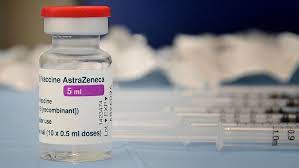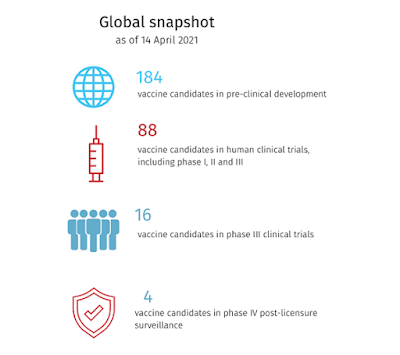I'll add a caveat here: I'm not a medical expert. Don't get medical advice from social media or even blogs like mine. Go to your doctor. What I've done is glean what I can from the information that is publicly available. I may be wrong on many points, so apply a good deal of critical thinking to what I've written here as you should to any information that is presented to you: particularly if it claims to be authoritative.
COVID-19 Vaccines in general
There are currently four vaccines that are authourised for use in preventing the SARS-CoV-2 infections. Technically, they are in phase IV global post-licensure surveillance. They are:
- Pzifer-BioNTech (mRNA)
- Moderna (mRNA)
- J&J/Janssen (viral vector)
- Oxford/AstraZeneca (viral vector)
Other vaccines are in different stages of development. Most of these will not make it into public release. Now that there are already vaccines in production and distribution, any vaccines further developed will have to demonstrate they are better than those currently available. Not listed is the Chinese based Sinovac vaccine called CoronaVac and the Russian Gamaleya (Sputnik V) vaccine. Both of these vaccines use traditional production techniques making them cheap to produce but they have poor effectiveness profiles. Many third world countries have opted to use them, but not a single western nation has.
The numbers change daily. You can follow the progress of vaccine candidates here. For those who claim the vaccines haven't been tested, download the daily R&D blueprint and check any trial link you link. Thousands of clinical trials for safety & effectiveness have been and are being conducted.
Oxford-AstraZeneca (AZ) Vaccine
The method used to provoke an immune response is called "viral vector'. It uses a modified version of a different virus - called the vector. This vector is injected intramuscularly and enters the cells of the muscle. From there, the vector manufactures a spike protein identical to that found uniquely on the surface of the SARS-CoV-2 virus that causes COVID-19. The cell then displays the protein on its surface. Our immune system recognises it shouldn't be there and triggers an immune response targeted at the spike protein. Since the body is fighting an 'infection', we have the usual symptoms that accompany an immune response. This includes injection site pain, fever, lethargy, feeling 'sick' etc. However these are immune response reactions, not an actual disease. Different people will have different responses. source
At the end of the process, our bodies have learnt how to protect us against this infection. Effectiveness after two vaccines vary according to the variant encountered. Certainly, this vaccine is much less effective than the Pfzer vaccines (>90%). However, best data to date shows at worst it is 61.7% effective (UK B117 variant) and at best it is 81.5%, with the average being 77.3%. source
A recently published paper in The Lancet is a little more critical, estimating the effectiveness at 67%.
Blood Clots
Once the AZ vaccine was being administered globally, reports started emerging of blood clots at an significant uptick over the background rate. In about 1 in 4 of these, death was the result.
It's important to clarify something here as a sidebar. When you administer a medication to millions of people, large numbers will have 'something' medical happen to them over the month following the administration of the medication. People will have heart attacks, strokes, embolisms etc. that have nothing to do with the administration of the medication. However we do have a good idea of the general rate at which these events occur. In fact, your life insurance company can tell you the percentage chance of any medical event happening to you over the next year. It's quite a well studied science. This is why all adverse events that happen following vaccination are reported. This reporting is mandatory and the reports are publicly available and searchable. In Australia, it is the DAEN (Database of Adverse Events Notification). In the United states it is VAERS (Vaccine Adverse Event Reporting System). Researchers compare adverse events with the rate that normally occurs. When there is an 'uptick' in an event, it is investigated. In the case of serious events, they are all investigated thoroughly as a public health measure.
At first, since the number was very low, there was skepticism that the AZ vaccine was the cause as vaccines have never been known to cause blood clots. Vaccines are injected intramuscularly not intravenously and have not direct connection with blood.
From the investigations, however, the AZ vaccine has been identified as the likely cause in over 100 cases. From these numbers, it is likely the incidence of a blood clot from the AZ vaccine is about 1 in 1 million. The phase III clinical trials involved 20,000 people who received the vaccine. Blood clots were not observed in any of the participants.
UPDATE 30 Sep 2021: We have a lot more data on the incidence. With increased surveillance for TTS, including very minor instances (headaches, thigh soreness etc) there have been 125 reported cases in Australia out of 9.6 million vaccinations. This makes the chance of a blood clot 1 in 76,800. Now, that's a lot higher than one in a million, but remember, these include minor cases. Of those 125 people, 8 people died, six of them women. This is a mortality rate of 1 in 1.2 million. Certainly much better than catching COVID, but since there is an alternative, if you are female and under 50, definitely don't get the AZ vaccine, get the Pfizer or Moderna instead. See ‘Weighing up the potential benefits against risk of harm from COVID-19 Vaccine AstraZeneca’
How can the AstraZeneca vaccine cause blood clots?
So far, experts do not know, however there are some conjectures. Foremost amongst these is that in rare cases, the vaccine also induces and immune reaction against a protein found in blood platelets. On the sniff factor, this sounds (at least) like a good explanation.
Patients with blood clots were found to have antibodies against Platelet Factor 4 (PF4) which is a symptom of heparin-induced thrombocytopenia. So it may be the case that those patients have this disease already, but it is undiagnosed and the vaccine triggers this response. People are only tested for this if they present to hospital with a blood clot. Blanket testing of people would be pointless because of false positives according to Baye's Theorem.
However, everything is still conjecture at the moment. The reality is that we don't know if it is the adenovirus (the vector) or the spike protein is linked to the clots.
What do we know?
In simplistic bullet point form, this is everything we do know:
- It occurs at a rate of approximately 1 in 76,800
1 million people - It mostly affects women under 55
- Heparin-induced thrombocytopenia is more common in women than men and less likely to be diagnosed at a young age.
- Blood clots are a symptom of COVID-19. You are far more likely to get a blood clot from COVID-19 than from the AZ vaccine.
- To put the risk into comparison, the risk of DVT from flying longer than four hours is 0.079% or 1 in 1265. The risk of a blood clot from taking oral contraceptives is around 0.04% or 1 in 2500.
So, is it safe?
Relative to what?
Taking the AZ vaccines is certainly safer than getting COVID-19 by several orders of magnitude. Millions of people have died from COVID-19 compared to the 25 people that have died probably because of the AstraZeneca vaccine. In addition, antivaxers are lying about adverse reactions by posting fake testimonials to social media. People inundated with hundreds of personal stories may find it compelling, but the reality is that this vaccine is still far safer than not only most other medical interventions, but safer than most daily activities such as driving and eating.
It's only natural to be concerned about risks we hear about in the media regularly or on social media, particularly for activities we don't regularly undertake. But in reality, if you are concerned about the risk of taking the AZ vaccine: Don't fly in a plane, don't drive a car and don't take paracetamol. All of these have higher risk profiles by several orders of magnitude.
However, if we are looking at the risk of taking the AZ vaccine compared to the Pfizer vaccine, then yes. Take the Pfizer vaccine anytime. The Pfizer vaccine will knock you around more - many people need a day or two off work after having it. But its effectiveness is MUCH higher and serious adverse event reports do not statistically exceed the background rate (despite what you facebook group might say).
Achieving Herd Immunity
Besides protecting the individual, the purpose of vaccines is to reduce the R(Eff) rate below 1. For COVID-19, R0=2.4. Herd Immunity (s) = 1-1/R0 = 58.33%.
This means that we need to vaccinate 87% of the population with the AZ vaccine, or 62% of the population with the Pfizer vaccine. However, the higher the rate the better. Anything below these numbers will lead to outbreaks. Leaving children out of the equation (no COVID-19 vaccine has been certified for paediatric use) then it is impossible to achieve herd immunity with the AZ vaccine.


No comments:
Post a Comment